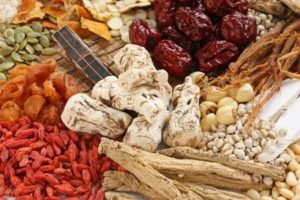I don’t talk a lot about Chinese Herbs in my blog. However in my office herbs, acupuncture and yoga are all equal. They are my three most successful tools. However more often than not people come in for a treatment or consultation and are completely opposed to herbs.
This blog post, I hope, will quiet some of those fears. So here is a FAQ of herbs.
What if I am on Western Medication?
As part of my herbal training and licensing process I completed a Pharmacology class to learn about what happens when there is an interaction between a Western medicine (or Western herb) and a Chinese Herb. I have access to an amazing online database that is constantly being updated that includes all documented research on drug and herbal interactions. When I give you my word that everything will be fine, I’ve done a search on your specific medication (generic or brand name) and the specific herbs or patented herbal formula I am giving you.
Where do the herbs come from?
I purchase powdered herbs from the highly respectable dispensary at the New England School of Acupuncture. The dispensary at NESA follows the most up to date guidelines according to the FDA. If you have any further questions please review their website. All of my patent medicines or prescriptions in pill form are from the company Blue Poppy in Boulder, CO. For information about their practices and respectability visit their website.
What sort of training is required to become an herbalist?
In the State of Massachusetts the requirement is a minimum of 1,905 hours of clinical/didactic training, with 660 hours of training hours specifically in herbs and 210 clinical hours of acupuncture and herbs. It is not legal to prescribe Chinese Herbs or for that matter to purchase them wholesale unless you are licensed.
When should you use acupuncture and when should you use herbs?
Most acute pain issues are better served by acupuncture. However long term stubborn pain issues are sometimes best treated with herbs and acupuncture. GYN issues are usually more successful with herbs. Any depletion issue such as chronic fatigue or poor digestion is better treated with herbs. Phlegm, headaches and other cold like symptoms are usually best treated with both. Sleep and emotional disorders are usually improved with acupuncture but prevented with herbs.
How expensive are herbs?
Patent formulas run about $20-30 for two weeks of treatment. Custom powdered formulas are about $30 for 7 days. This does not include the service fees for my time writing the prescription and ordering it ($30 without acupuncture, $20 with an acupuncture appointment).
Are Chinese Herbs regulated by the FDA?
Yes, to some extent. They are food grade medicine like supplements and vitamins and are controlled with similar guidelines. Each state has different laws about herb distribution and licensing of herbalists. The FDA has banned the import and usage of some Chinese herbs that modern research has found to be dangerous. Some of these findings are supported and understood by practitioners. However some of the herbs were banned because people without training were misusing the herbs. The famous example is the Chinese Herb Ma Huang (Ephedra), a Wind Cold Herb utilized short term (2-3 days) for wheezing, severe chills and clogged pores preventing sweating or the release of fluids through urination. Years ago a group of people used this herb as a diuretic for weight loss and administered the herb in high doses for long periods of time and there was severe injuries and deaths. A trained herbalist would never give someone without severe chills an herb that hot as it would be incredibly dangerous.
How do I take Chinese Herbs?
On an empty stomach half hour before meals or an hour after a meal. This allows the herbs to be digested purely without competing for digestive power.
What are signs of an allergic reaction?
Allergic reactions are incredibly rare as this is a food grade substance. If you know you are a hyper-allergic person it is a helpful thing to tell your herbalist so they can avoid similar herbs (ie allergic to oranges avoid orange peel). If there is going to be a negative reaction usually it is digestive. Occasionally people find they can’t digest the herbs. When this happens, whether it is loose stools, constipation, belly gurgling or gas, rather than stop the herbs cut the dose back. Drop from 4 spoons to 3 spoons instead of coming off the formula all together. Most of the time this reaction is when someone is being treated for qi deficiency and the herbs are strong qi tonifiers. It is similar to someone with a weak digestive system not being able to handle kale or cabbage. Eventually it would be a great thing for them but they need to work up slowly. Usually within a week the patient can go back up to the full dose and digest it without problems.
Copyright: cokemomo / 123RF Stock Photo